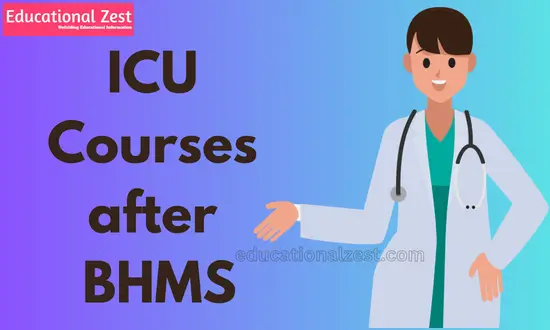BHMS graduates can pursue allopathic Intensive Care Unit and Critical Care Medicine programs. Students can study about ICU, emergency medicine, and critical anaesthesia in these classes. Direct enrolment is typical for these classes. To enroll in these classes, students must have completed an approved BHMS degree program and meet English language and BHMS minimum marks requirements. For entrance requirements, course material, and more, interested students may contact the desired institutions. So when it comes to the ICU Course After BHMS then you will need to follow the below mentioned information
List of ICU Courses after BHMS
- Certificate in Critical Care Medicine
- Certificate Course in Critical Care Nutrition
Details of Courses
Critical Care Medicine
Critical care involves intensive monitoring and treatment of severely ill individuals. Medical practitioners with BHMSs can take several critical care medicine courses. The ICU Course After BHMS includes:
Fellowship Course in Critical Care Medicine: This yearlong critical care medical fellowship trains in intensive care unit patient care. BHMS and MBBS are required for this program.
Diploma in Critical Care Medicine: Critical care medicine is studied and practiced for a year in the Diploma Program. BHMS graduates are eligible for this program.
Postgraduate Diploma in Critical Care Medicine: A two-year postgraduate diploma in critical care medicine will teach you everything about the field. BHMS, MBBS, or BDS are required for this program.
Certificate Course in Critical Care Medicine: A certificate-granting short-term training on basic, advanced, and critical care cardiovascular life support. BHMS graduates are eligible for this program.
Course prerequisites and details may vary. Before applying to any of the above programs, interested parties should review the requirements.
Certificate Course in Critical Care Nutrition
This ICU Course After BHMS is a special one. Intensive care patients need nutrition to heal. Adequate nutrition aids recuperation, boosts immunity, and prevents issues. Malnutrition in critically ill individuals impairs wound healing, immune response, muscle atrophy, and infection risk. Healthcare practitioners recognize the necessity of providing specific dietary support to meet patients’ increased energy and nutrient needs throughout recovery. Critical care patients’ health, responsiveness to medical therapies, length of hospital stay, and overall well-being and recovery can be improved by paying attention to their dietary needs.
Participants in the Certificate Course in Critical Care Nutrition gain an in-depth familiarity with the special nutritional needs and difficulties of patients in critical care settings. In order to improve patient outcomes in intensive care units, healthcare workers should take this course to gain the information and abilities necessary to provide superior nutritional treatment.
Eligibility Criteria

Critical Care Medicine
Candidates holding the degree of MBBS, AYUSH, Final year medical graduates and interns are eligible for this course.
Admission Process
For taking admission in these courses you need to log in the official website of the chosen institution with valid email id and password. After that you will be able to access the course modules online. You will get your certificate on time if you finish all Modules and the final exam by the Course Expiration date.
Admission Fees
The admission fee for pursuing Critical Care Medicine or Critical Care Nutrition varies for different institution. Approximately it can cost you from seven thousand rupees to twenty five lacs per year.
Job Opportunities
After completing such courses you can work as a Diabetologist, Nutritionist, Lecturer, Researcher, Critical care Health administrator, Critical care Healthcare management executive, etc. You can also join as senior residents or consultant.
Salary Package
You can expect an approx. salary range of Rupees elven lacs to twenty six lacs per year.
Scope
The gap between BHMS and allopathic can be bridged using a variety of post-MBHS “bridge courses.” The following is a partial list of the topics covered in these classes.
Students who get a BHMS degree might increase their employment prospects by taking these courses. This opens up doors for them at more traditional healthcare facilities, such as hospitals, universities, and research labs.
Allopathic courses delve deeper into modern medicine. Due to their extensive knowledge of anatomy, physiology, pharmacology, and diagnostics, BHMS graduates can diagnose and treat many medical conditions.
Due to their homoeopathic background, BHMS graduates bring a distinct perspective to allopathic practice. Integrating conventional medicine with holistic healing and alternative therapies can help them provide more comprehensive and patient-centred care.
These bridging programs allow BHMS grads to hone their skills in a specialized area of medicine, like anaesthesiology or critical care.
Taking these classes allows BHMS grads to seek positions in academia, research, and medical innovation. They have opportunities to take part in clinical trials, contribute to medical publications, and work as professors at medical schools.
By completing these programs, BHMS grads can boost their standing in the medical community and get better jobs. They can get credentials that are recognized and respected all around the world.
Conclusion
Now that medical research is always advancing, adding new abilities to your portfolio boosts your career. It prepares you to handle challenging cases, offer exceptional patient care, and lead the rapidly increasing area of homoeopathy. After completing your BHMS, take advantage of some of the greatest homoeopathy courses to make a difference. This is your chance to shine and help people worldwide who want better, more efficient healthcare. Increase your homoeopathy zeal by studying more.
Is it approved by the MCI ??
Not sure you need to contact the authorities.
How to apply?
Hi, choose an Institution and research for an accredited institutes offering your desired ICU course format. You can explore options on the NMC website or consult medical associations like Indian Medical Association (IMA).